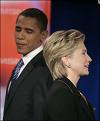How Hillary’s exit might have boosted Obama’s chances of victory
 Washington, August 12 : Hillary Clinton’s exit from the presidential race may have consolidated Barack Obama’s chances of becoming U. S. President, suggests a new study by an Indian-origin researcher.
Washington, August 12 : Hillary Clinton’s exit from the presidential race may have consolidated Barack Obama’s chances of becoming U. S. President, suggests a new study by an Indian-origin researcher.
Akshay Rao and his colleagues at the University of Minnesota''s Carlson School of Management have discovered that when an option enters and later leaves a market, the most similar remaining option — in this case Obama — stands to benefit.
The researchers say that this rule is applicable to almost everything, including political candidates, beer, healthy care plans, automobiles, etc.
They say when one attractive option becomes unavailable, people gravitate toward the most similar remaining option.
Rao and his colleagues have found that the disappearance of an option from a choice set can increase the appeal of the remaining selection that is most similar to the now-absent option.
This, according to them, happens because consumers and voters attach greater importance to issues or attributes on which the two similar options competed.
"The presence of the third alternative shifts the focus of the customer. If you have two automobiles extolling their fuel efficiency, while a third promotes style, purchasers pay more attention to the fuel efficiency criterion. Then, when one of the high fuel efficiency cars leaves the market, the other fuel efficient car draws consumers. In the case of automobiles it might be fuel efficiency, and in the case of political candidates it might be health care. When the third choice exits, the remaining candidate with the most similar attributes becomes the favourite - even if they weren''t before," says Rao.
"We also call this effect the ''phantom decoy'' effect because, like pre-announced software that is never released, these desirable options that become ''unavailable'' may never actually exist," he adds.
Trying to further explain phantom decoys with an example of on-line vacation options, Rao said that a consumer might search on the Internet and see three vacation options — a four star hotel far from the beach, a lower quality hotel closer to the beach, and a five star hotel near the beach.
Just in case the buyer tried to book the five star hotel and it turned out to no longer be available, Rao added, the person would look to the next closest option i. e. the four star hotel, even though it was not initially preferred.
According to Rao, the same happens in political choice.
He and his colleagues suggest that marketers and pundits pay careful attention to this effect.
"The increase in affinity that a product may receive when a decoy option, real or not, is removed can mark a significant change in consumer choice. In terms of elections, even a 5 percent increase in preference makes a huge difference at the ballot box," says Rao. (ANI)